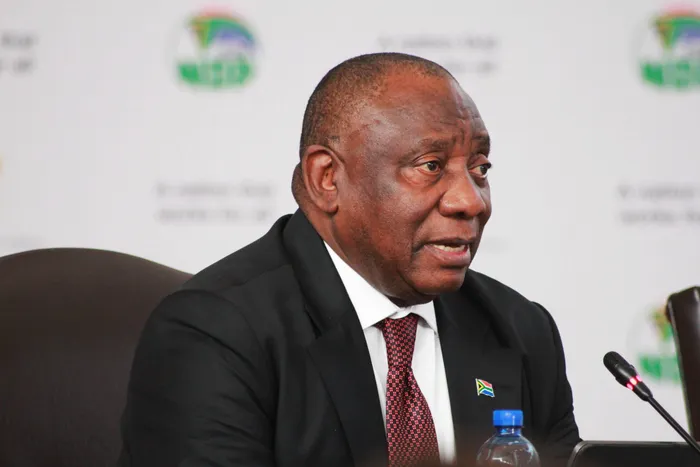Ramaphosa urges women to raise their voices at National Dialogue, despite key withdrawals

President Cyril Ramaphosa is calling on women to lead discussions at the upcoming National Dialogue in Pretorie, despite withdrawals from key legacy foundations.
Image: Sandi Kwon Hoo / DFA
President Cyril Ramaphosa says the upcoming National Dialogue must serve as a platform for “women to raise their voices,” even as several prominent legacy foundations have withdrawn from the event, regarding concerns over its direction and governance.
The first National Convention of the National Dialogue is scheduled to take place on August 15, 2025, in Pretoria.
In his weekly newsletter on Monday, Ramaphosa said organisations from across South Africa would gather to launch the National Dialogue process on Friday, which aims to unite citizens around solutions to the country’s pressing challenges.
“Given the history of women’s struggles in our country, it is to be expected that at this critical moment in our history, women will once again come to the fore and participate actively in the National Dialogue process,” Ramaphosa said.
“When we announced the National Dialogue, we said it would bring together individuals and organisations from across society to find common ground and new solutions for our country’s many challenges.”
He stressed that women, who make up more than half of South Africa’s population - are affected by every political, social, and economic issue, often more severely than men.
“Recognising that the lives of women are bound up with the future of the nation as a whole, we are counting on women’s groups and organisations to mobilise around the National Dialogue process,” he said.
Ramaphosa said that the government is working in partnership with various stakeholders to ensure women are equally represented across the structures supporting and guiding the dialogue.
“To remain true to our objective of giving all sectors of society a voice as we build the South Africa we want, we must ensure that all women are represented,” he said.
“This means a concerted effort to mobilise young and old, urban and rural dwellers, women from different ethnic and linguistic communities, women with disabilities, and LGBTQI+ people.”
He acknowledged that women’s struggles are not the same.
“Although they may be similar in certain respects, the issues and challenges facing rural women and women in traditional communities differ vastly from those of women in urban areas with access to education, resources, and public services,” he said.
Ramaphosa referenced last year’s South African Women’s Pre-National Dialogue, convened by the Institute for Justice and Reconciliation, which emphasised the need for diverse voices to be reflected in the process.
He also claimed that the Government of National Unity (GNU) is committed to inclusive growth, job creation, tackling poverty, and building a capable, ethical, and developmental state - all with a gendered lens.
“No government decision should be made without due consideration of how it impacts women specifically,” he said.
Citing the country’s history, Ramaphosa praised the central role of women in past social and political movements - from the anti-pass protests and rent boycotts to modern-day struggles against gender-based violence.
“With the first National Convention taking place during Women’s Month, I call on all sectors of society to come together to ensure the full participation of all women in the National Dialogue,” he said.
“This would be the most fitting and powerful tribute to the legacy of the pioneers of 1956.”
Despite the president’s appeal, the National Dialogue has been rocked by the withdrawal of several prominent organisations, including the Steve Biko Foundation, Thabo Mbeki Foundation, Chief Albert Luthuli Foundation, Desmond and Leah Tutu Legacy Foundation, WDB Foundation, Oliver and Adelaide Tambo Foundation, and the Strategic Dialogue Group.
In a joint statement issued on Friday, the group said the decision was made with “deep regret,” but was necessary to protect the process’s credibility and integrity.
They accused the organisers of shifting the initiative away from its citizen-led origins toward government control.
“What began as a citizen-led initiative has unfortunately in practice shifted towards government control,” the statement read.
“In pushing forward for a Convention on August 15, at the will of government officials and against the advice of the Sub-Committee Chairs, we believe that a critical moment in which citizens should be leading will be undermined.”
The group raised concerns about a rushed timeline, inadequate logistics, and a lack of meaningful engagement.
They warned that the Convention, as currently planned, risked becoming more symbolic than substantive.
“The rushed timeline, constrained logistics, and limited interactive design mean that the proposed Convention no longer offers a meaningful platform for engagement,” they said. “It risks becoming more performance than participation.”
They also cited possible violations of the Public Finance Management Act due to “emergency procurement” processes and unresolved disagreements within the Planning and Technical Task Team (PTT).
While they have withdrawn from the August 15 event and related planning structures, the Foundations reaffirmed their commitment to the broader goals of the National Dialogue.
They proposed that the Convention be rescheduled for December 15, 2025, allowing for better preparation and ensuring participatory integrity.
“We cannot pursue that goal by cutting corners, centralising power, or rushing the process,” they said.
A press conference is expected to be held on Monday to provide further details.
simon.majadibodu@iol.co.za
IOL Politics